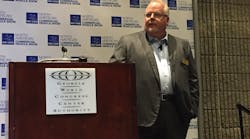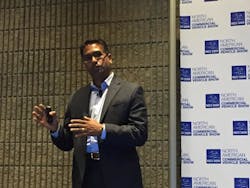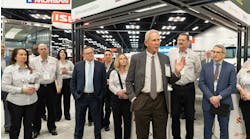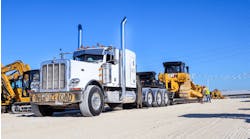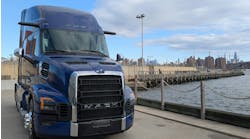ATLANTA. Brian Kessler, who took over as CEO for Tenneco back in May, said during a press event here at the inaugural North American Commercial Vehicle (NACV) show that he believes the company’s future growth through 2030 is going to be strongly tied to the commercial truck and off-road highway markets.
“Big trucks are a little more intriguing for us,” Kessler said. “Over the next 15 years more diesel engines will come under regulation than are currently under regulation.”
As a component supplier to truck manufacturers, focusing on emission control systems and ride performance-related items such as shocks, Kessler noted that Tenneco is positioned to focus on three key areas going forward where commercial vehicles are concerned: Reducing “criteria” pollutants from truck exhaust; improving fuel economy; and taking advantage of growing truck demand in China and India.
Ben Patel, vice president and chief technology officer at Tenneco, added that while there is “no crystal ball” in terms of what future products will be needed for heavy trucks, they need to be “on the shelf” when the customer is ready for them.
That’s tough to do, he added, because it takes years to fully develop and validate components aimed at the commercial truck market.
Patel went through a list of Tenneco’s product offerings to highlight some of the areas where he thinks demand will be strongest:
Beyond Euro VI Concept: In compliance with current Euro VI exhaust emission regulations for on-road trucks, Tenneco developed a compact and modular one-box solution that includes all required exhaust aftertreatment components, such as diesel oxidation catalyst (DOC), diesel particulate filter (DPF) and selective catalytic reduction (SCR) converters as well as the company's proprietary advanced mixing technology. The concept box also features advanced technologies designed to support further reductions in oxides of nitrogen (NOx) emissions and in-service conformity (ISC) requirements, including thermal management solutions such as lightweight fabricated manifolds and active heaters to support low temperature NOx efficiency.
Waste heat recovery: Driven by total cost of ownership and carbon dioxide (CO2) legislation, Tenneco is developing solutions to provide or integrate heat exchangers into the Euro VI box as a key component of Rankine cycle-based systems that convert wasted exhaust heat into mechanical power.
XNOx Liquid Urea SCR: The newest member of its XNOx technology family, introduced back in 2011, this system now features and integrated a dosing control unit concept which includes the pump, motor, injector, controller, sensors, water cooling and control software in a single integrated device. Other enhancements include an optional controller, which features a flexible engine interface design and can predict engine-out NOx and account for ammonia storage and catalyst degradation.
Thermal Management Solutions: As efficiency improvements and new low-NOx standards continue to drive the need for ultra-high efficiency SCR, Tenneco’s cold start thermal unit offers an optimal solution, providing active heat management for rapid catalyst light-off and efficient NOx conversion through the full range of operating conditions.
Advanced Mixing Technologies: Tenneco’s custom-engineered mixing components ensure consistent mixing of liquid urea and optimized performance of the SCR aftertreatment in diesel engine exhaust systems. Such “mixing solutions” are critical to insure injected diesel exhaust fluid (DEF) turns into gaseous ammonia without the formation of undesired deposits, even at low engine loads Patel said a key functional component of such “mixing solutions” is Tenneco’s patented swirl pipe mixer, which can be incorporated into Tenneco’s Euro VI box solution.
Cabin Suspension: Tenneco offers a full range of coil spring cabin dampers, air spring cabin dampers and lateral cabin dampers. Coil spring over shock (CSOS) and air spring over shock (ASOS) cabin suspensions differ in terms of the natural frequency of the mass-spring system to provide optimized robustness and comfort. Lateral dampers provide high damping at low piston speeds to keep the swing movements of the cab under control. Integrated Height Valve (IHV) is an internal valve within the air spring damper module for cabin leveling which reduces assembly complexity, time and cost.
Axle Dampers: 45mm axle dampers are used primarily as rear axle dampers for vehicles with a gross vehicle weight (GVW) greater than 15 tons and on trailers. A new valve system provides increased “tuneability” and allows higher compression damping force while maintaining the lifetime performance typical of Tenneco dampers. Tenneco also offers 35mm axle dampers, generally used as front dampers for vehicles with a GVW between six and 15 tons.
Seat Dampers: Available in standard and manually adjustable versions, seat dampers provide improved ride comfort. Tenneco’s manually adjustable dampers allow drivers to adjust seat settings to their weight and ride preferences. Dampers incorporating velocity progressive damping can automatically adjust by reacting quicker and more responsively to large impact events.
